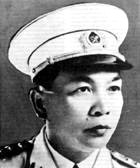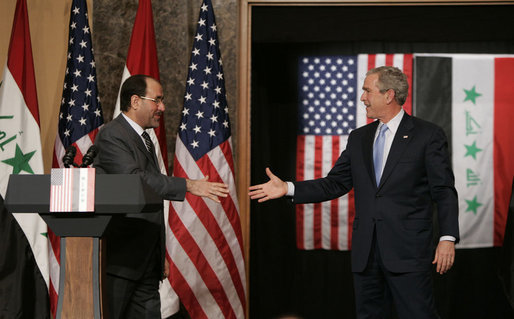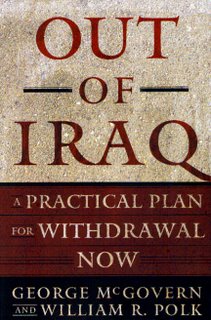
Vô Nguyên Giap, North Vietnamese general and Minister of Defense during the Vietnam War
He had nothing to do with the US loss in the Vietnam War; it was John Kerry and all them other flower children
In a book review cited in Iraq strategy takes page from Vietnam playbook by Peter Spiegel Los Angeles Times 11/24/06, Col Stuart Herrington challenges some particular elements of the stab-in-the-back alibi about the Vietnam War. An excuse of which some in the military's officer coprs are so fond. But in the end, he embraces the core of the stab-in-the-back excuse.
He's reviewing the book Abandoning Vietnam (2004) by James Willbanks (also quoted in Spiegel's article) in Parameters (US Army War College) Spring 2005. Herrington writes:
Willbanks' conclusion that "Vietnamization failed and failed miserably" should surprise no one. His analysis of the reasons for this failure includes that the South Vietnamese did not fight, except in exceptional cases when they were well-led, such as during the two-week defense of Xuan Loc by the ARVN 18th Division in April 1975.
Some Iraqified version of "Vietnamization" is what the Cheney-Bush administration has been attempting, i.e., "As the Iraqis stand up, we will stand down".
Herrington continues:
This said, even though the 1975 rout of the ARVN was almost total, and showed our ally at that time to be unable and unwilling to fight, readers of the book might overlook the fact that between 1960 and 1975, the war cost the South Vietnamese military 275,000 combat deaths, as compared to American combat deaths of 46,000, or the fact that, during the three- to five-day evacuation of Danang in March 1975, the estimated South Vietnamese military and civilian deaths of 60,000 described by Willbanks exceeded the total losses of the US military for the entire war. History should honor South Vietnam’s fallen, whose sacrifices are even more admirable (and tragic) when one considers the flawed political system for which Saigon’s soldiers laid down their lives.
Relevant comparative question: have we seen the Iraqi army carry on that kind of combat? When they are acting as the national army, I mean, not when they are acting as Shi'a militia.
Still, despite recognizing some of the real problems of Vietnamization, Herring does what so many military analysts do when discussing the Vietnam War; he refers to the loss of public support in the vaguest terms:
Simply put, having wasted more than three years (until 1968) pursuing a flawed strategy, the Pentagon lost the support of the American population, and was not given the time to get it right, even when it was clear that General Creighton Abrams’ pacification and Vietnamization approach might have worked.
"Simplistically put" would be more descriptive. In all these discussions about Vietnamization, the role of our South Vietnamese allies and of the enemy should be kept in mind. They played a role, too. But in the outlook Herrington is reflecting here, there's no way the invincible American military could have lost in Vietnam. It must have been some nefarious evil force back home. You know, like the American public.
He applies this (perceived) lesson of Vietnam to Iraq, in an observation that is warranted, so far as it goes:
In spite of military experts who absorbed the lessons of Vietnam and warned of the sizable commitment and time required to consolidate the initial military victory and achieve a stable, revitalized, and democratic Iraq, since the fall of Baghdad we have stubbornly attempted to accomplish these goals with too few forces. Worse yet, having lost almost two years since the masterful campaign that toppled Saddam Hussein, the proverbial clock is ticking, and the Bush Administration is at real risk of losing popular support at home.
And for very good reason, though Herrington obviously doesn't seem to think so.
The final two sentences of Herrington's review have him embracing one of the most deeply problematic "lessons of Vietnam", one that is at the core of the stab-in-the-back excuse:
For just as Hanoi correctly reckoned in 1968 that the American center of gravity was the will of the American people, so too have the Iraqi insurgents and their al Qaeda allies made the same calculation. One hopes that planners in Washington understand this, and that the Commander-in-Chief will use his second-term political capital to hang tough. (my emphasis)
Hey, no prob there. Commander-in-Chief Bush has been staying the course. "We'll succeed unless we quit," he said in Vietnam the other day.
The concept of the "center of gravity" in a war is essentially an unknown phrase in American civilian politics. But it's a very familiar phrase in Pentagonese. And it ought to seet off alarm bells every time we hear some military officer or analyst say that American public opinion was or is the "center of gravity" in a war.
To put it briefly, this "center of gravity" concept derives from the teachings of the 19th-century Prussian (German) military theorist Carl von Clausewitz, whose writings have acquired the status of holy writ for today's US officer corps. (Historical tidbit: he was also the favorite military theorist of the Russian revolutionary leader V.I. Lenin.) An English edition of his 1874 classic On Waris available in English translation at Project Gutenberg.
Essentially, the "center of gravity" in this context means the key factor that has to be mastered to win a war, to beat the enemy, a key weakness or strength. (See the additional commentaries cited below, one of which suggests that this common contemporary understanding of the term is not actually how Clausewitz himself understood it.)
I haven't yet seen anyone do an adequate job of laying out why this is such a problematic concept for a democracy, the idea that public opinion back home is the US military's own "center of gravity" in a foreign war. Defining American public opinion as the "center of gravity", understood as strength or weakness, or the key to success in a war, means that the most vital task of the military in a foreign war is to convince the American public to supoprt their war policies.
And if public opinion turns against the current war policies by definition that stregthens the enemy. This makes the American public alegitimatetarget of military "information operations", that is, systematic deception.
I've written about this before and will again. Here, I'll just say that this notion of American public opinion as the "center of gravity" (in the sense that Herrington uses it in the review I quoted) in a foreign war is an open-ended, stab-in-the-back alibi for military failures.
It also leads to fundamentally undemocratic conclusions.
Additional sources on Clausewitz and the "center of gravity" concept:
Here is an excerpt from Clausewitz and His Works by Christopher Bassford (2002):
Clausewitz did provide some guidance in choosing military objectives. Perhaps most important was the idea of focusing one's military efforts against the enemy's "center of gravity" ("Schwerpunkt"), which has become an important concept in American doctrine. Clausewitz's use of this term is problematic, however. He often used it in very general terms to mean something like "the main thing" or "the key point at issue." He used it in tactical discussions to denote the main line of attack. When applied to operations or strategy, however, the term assumed a more narrow definition. Insofar as the center of gravity "belongs" to one side or the other, it is the most important source of that side's strength. Operationally, it usually appears as the key enemy field force. Strategically, it is most commonly the enemy's military forces as a whole or in part, but it can be his capital or something less concrete, like the common interest of an alliance or even public opinion.
We should remember, however, the context for Clausewitz's use of this metaphor: war as a wrestling match. This metaphor is fundamental to Clausewitz's outlook on strategy, but translation problems sometimes obscure his point, as in Clausewitz's famous characterization of war as a "duel." Used in all of the English translations, it is not a very good substitute for the original German "<em>Zweikampf</em>," literally "two-struggle." A duel with sword or (particularly) pistol is based more clearly on skill than on raw strength and lacks the dynamic character, the multiple points of contact, and the mutability of a wrestling match, Clausewitz's actual imagery. The latter metaphorprovides a much better graphic image into which to fit the famous term "center of gravity." The center of gravity may be "the hub of all power and movement," but it is created by the interaction between the wrestlers and changes as they alter their relationship.
The term center of gravity comes from Mechanics. Clausewitz was clearly trying to use a scientific metaphor to force the reader to focus on key considerations, rather than frittering away his energy on peripheral concerns. Unfortunately, Clausewitz's statement that "A center of gravity is always found where the mass is concentrated most densely" is scientificly incorrect, and the metaphor -while useful and interesting - suffers accordingly. In any case, as usual with Clausewitz, the correct identification of any center of gravity would have to be consistent with the character of the situation and appropriate to the political purposes of military operations. To seek for an all-purpose strategic prescription in Clausewitz's discussion of the center of gravity will therefore lead to the usual frustration. The rigid prescription simply is not there. Destruction of the enemy army is not the fixed goal of "Clausewitzian strategy."
A superficial reading of On War may, however, leave the reader somewhat confused on this point. Clausewitz's definition of strategy emphasizes battle, and he states quite clearly, time after time, that "there is only one means in war: combat."
See also Clausewitz's Center of Gravity: Changing Our Warfighting Doctrine - Again! by Antulio J. Echevarria II September 2002 (US Army War College Strategic Studies Institute). Also available here. Echevarria argues that Clausewitz saw "center of gravity" as more of a "focal point" on which to focus military attacks, not as a strength or weakness, as contemparary interpretations often use it.













